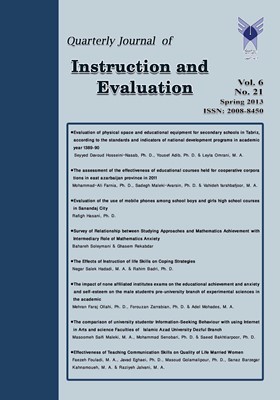The assessment of the effectiveness of educational courses held for cooperative corporations in east azarbaijan province in 2011
Subject Areas : Educational PsychologyMohammad-Ali Farnia 1 , Sadegh Maleki-Avarsin 2 , Vahideh farshbafjoor 3
1 - استادیار دانشگاه آزاد اسلامی، واحد تبریز، گروه علوم تربیتی، تبریز، ایران.
2 - عضو هیات علمی دانشگاه آزاد اسلامی واحد تبریز
3 - دانشگاه آزاد اسلامی، واحد تبریز، دانشآموخته کارشناسیارشد مدیریت آموزشی، تبریز، ایران
Keywords: effectiveness, instruction, cooperation and cooperative corporations,
Abstract :
The aim of the present study was to investigate the assessment of the educational courses held for cooperative corporations in east azarbaijan province. The statistical population consisted of 7593 people, including all the people participated in educational classes. Using the Morgan table the sample size was 357 people. The sampling method was clustering. To gather the data, researcher made questionnaire for effectiveness based on kirk Patrick pattern was used. Using cronbach's Alpha the reliability was 0.94.To analyse the data the descriptive and inferential statistics were used. Since the results showed that holding educational courses for cooperative corporations was higher than average, ie. (3/86). Among the four dimensions of effectiveness: reaction, learning, behavior and outcome, the results were 3/99, 3/84, 3/72 and3/70 respectively. According to these results it can be said that the courses were more effective in transferring the concepts rather than performance. This might be because of the emphasis on theoretical aspect and lack of motivation among the learners for obtaining knowledge and change.
اسلومن، مارتین (1382) استراتژی آموزش حرفهای، مترجم محمدضیایی، بیگدلی، تهران، نشر سارگل
پورصادق، ناصر(1384) رویکردهای ارزشیابی اثربخشی آموزشی، مجله تدبیر، تهران: سازمان مدیریت صنعتی شماره 160
جعفرعلی، هاشم (1389) کارشناس مسئول برنامهریزی آموزشی اداره کل تعاون استان اصفهان http://esftaavon.blogfa.com
حاجی، نسرین، (۱۳۸۴) بررسی میزان اثربخشی دورههای فوریتهای پزشکی جهاد دانشگاهی واحد علوم پزشکی تهران در سه ماه نخست سال 84، پایاننامه کارشناسیارشد مدیریت آموزشی
رحیمی، رحمتالله (1383) مقاله آشنایی با مفاهیم آموزش، پرورش و کار آموزی، www.mcls.gov.ir
ساعدپناه، مسعود(1386) ارزیابی اثربخشی دورههای آموزش ضمن خدمت از دیدگاه کارکنان بانک مسکن شهر تهران، پایاننامه کارشناسیارشد رشته علومتربیتی – آموزش بزرگسالان، دانشگاه شهید بهشتی تهران
سعادت، اسفندیار (1385) مدیریت منابع انسانی، تهران: انتشارات سمت
سیدجوادین، رضا (1387) مدیریت منابع انسانی و امورکارکنان، تهران: نشر نگاه دانش
عالی، صمد(1387) بررسی میزان اثربخشی آموزشهای تعاون در سطح استان آذربایجانشرقی، با راهنمایی دکتر اسکندر فتحی آذر، اداره تعاون کل تعاون استان آذربایجانشرقی
عسکری، عباس (1384)، بررسی تأثیر دورههای آموزشی طرح رشد و ارتقاء مدیران در وزارت نیرو، پایاننامه کارشنارسیمدیریت دولتی گرایش مدیریت نیروی انسانی دانشگاه تهران
عیدی، اکبر، (1387)، سنجش اثربخشی دورههای آموزشی، پایاننامه کارشناسیارشد مدیریت آموزشی، دانشگاه سمنان
مقنیزاده، محمدحسن (1381)، تعیین میزان اثربخشی دورههای آموزشی ضمن خدمت در مرکز آموزش عالی امام خمینی(ره)، فصلنامه علمی_ پژوهشی رهیافتی نو در مدیریت آموزشی، سال دوم، شماره پنجم پاییز 88
محمدی زهره (1388)، بررسی میزان اثربخشی دورههای آموزش مدیران دانشگاه علوم پزشکی مشهد از دیدگاه شرکت کنندگان در دوره، کارشناسیارشد مدیریت آموزشی دانشگاه شهید بهشتی تهران
نظام شهیدی، مهراندخت (1380)، اصول مدیریت تعاونی ها در ایران، تهران: نشر روشنگران نصر
Anderson, john (2000) Training Needs Assessment, Evaluation, Evaluation, success, and organization Strategy and Effectiveness: An exploration of the Relationships, Logan, state university Utah Utah
Barret, G., W.P. Swanson & V. A. Song (2005), Evaluation of training program for caregivers to aging adults, Journal of Extension, 43 (3):21-29
Carell Micheal R and et al. (2000). Personnel/ Human Resource Management. Mac Millan. Publishing
Dick, W. & Johnson B (2007). Evaluation in Instructional Design: The Impact of kirkpatricks Four Level Model. In R. A. Reiser, Trend and Issues in Instructional Design. New Jersey: Parson Prentice
Fig, W. (2004). Technology system development and training the effect of technology development of front desk employees CAPELLA UNIVERSITY. PHD
Foot. M. and Hook. C. (1999). Intriducting human recource management. Longman fullan and fullan and et al. (2003) curriculum implementation in a levy ed.
Hughes, Katherine L. & Judith Scott (2010) Assessing Developmental Assessment in Community Colleges, August 2010 CCRC Working Paper No. 19
Hogaboam, D. (2004). "Effects of a Teacher Inservice Training Model on Student Perception of Elementary Science". Dissertation Abstracts International, Vol. 56, No.5, P.1724.
Noe, Raymond. A, Hollenbeck, J. R, Gerhurt, B & Wright, P.M. (2008). Human Resource Management: gaining Competitive advantage. New York: Mc GrawHill
Patrick, Kirk D. (2006). Evaluating Training Programs: the Four Levels; San Francisco: Berrett- Koehler Publishers
patrick, Kirk (2005).Transferring Learning to Behavior; San Francisco: Berrett-Koehler Publishers
Patrick kirk. D. L. (2007) Evaluating training program. San Francisco 92 http://www.itpeopleindia.com/20030324/management1.shtml
Stronkhorst, Robert; van den Akker, Jan (2006) Effects of In-Service Education on Improving Science Teaching in Swaziland, International Journal of Science Education, v28 n15 p1771-1794 Dec 2006, EJ753843
Snell, S. A & Bohlander, G. W. (2007). Managing human resources. Thomson Publishing Company.
Yining Chen & LeonB. hoshowe (2010), Student Evaluation of Teaching


